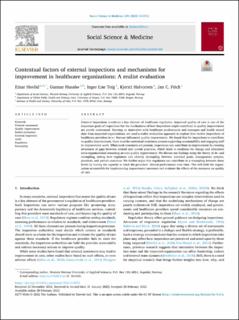Contextual factors of external inspections and mechanisms for improvement in healthcare organizations: a realist evaluation
Peer reviewed, Journal article
Published version

Åpne
Permanent lenke
https://hdl.handle.net/11250/2984219Utgivelsesdato
2022Metadata
Vis full innførselSamlinger
- Import fra CRIStin [3604]
- Institutt for samfunnsvitskap [453]
Originalversjon
Hovlid, E., Husabø, G., Teig, I. L., Halvorsen, K., & Frich, J. C. (2022). Contextual factors of external inspections and mechanisms for improvement in healthcare organizations: A realist evaluation. Social Science & Medicine, 298:114872. 10.1016/j.socscimed.2022.114872Sammendrag
External inspections constitute a key element of healthcare regulation. Improved quality of care is one of the important goals of inspections but the mechanisms of how inspections might contribute to quality improvement are poorly understood. Drawing on interviews with healthcare professionals and managers and health record data from inspected organizations, we used a realist evaluation approach to explore how twelve inspections of healthcare providers in x= Norway influenced quality improvement. We found that for inspections to contribute to quality improvement, there must be contextual structures present supporting accountability and engaging staff in improvement work. When such structures are present, inspections can contribute to improvement by creating awareness of gaps between desired and current practices, which leads to readiness for change and stimulates intra-organizational reasoning around quality improvement. We discuss our findings using the theory of de- and recoupling, noting how regulators can identify decoupling between intended goals, management systems, practices, and patient outcomes. We further argue that regulators can contribute to a recoupling between these levels by having the capacity to track the providers' clinical performance over time. This will hold the organization accountable for implementing improvement measures and evaluate the effects of the measures on quality of care.
